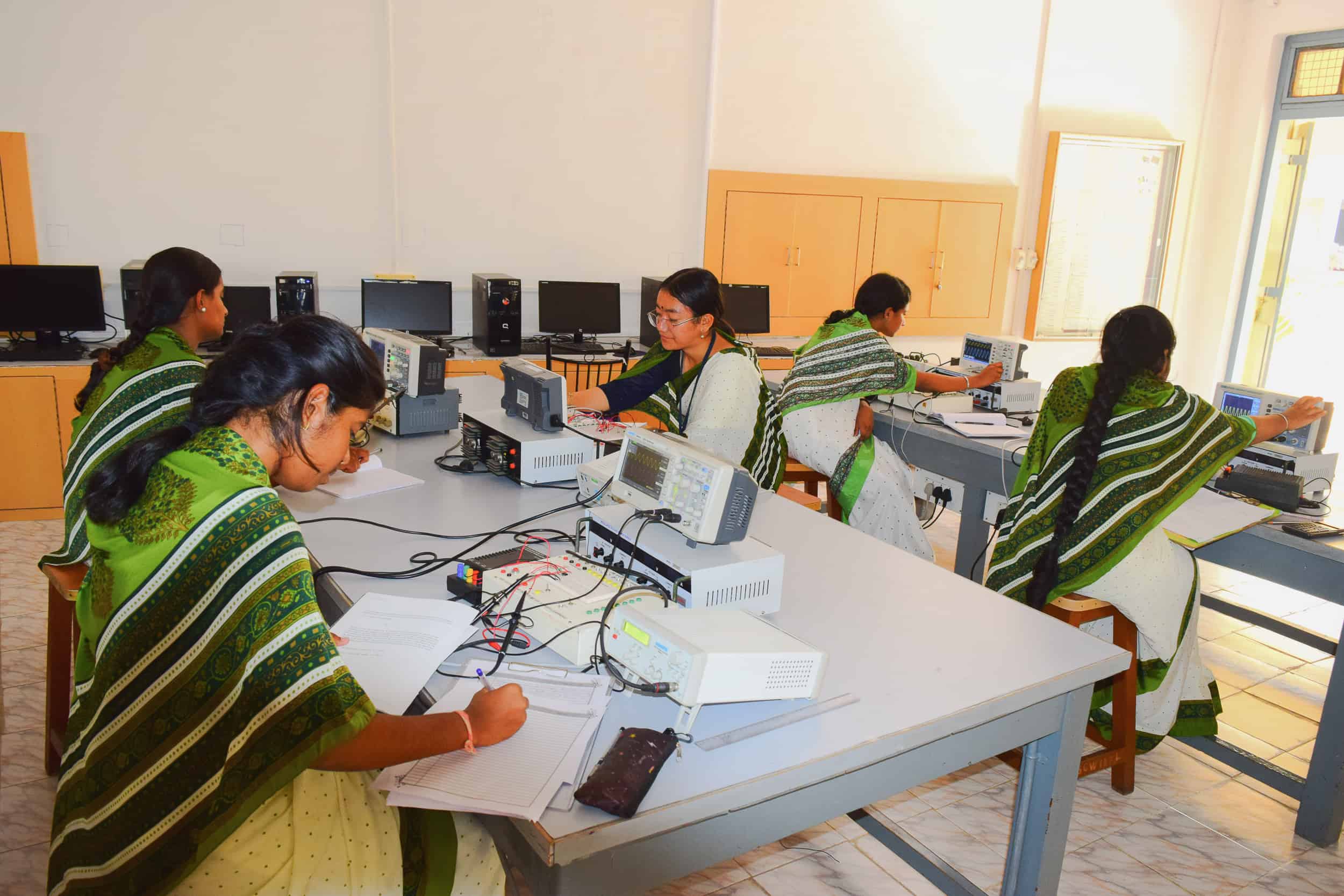Undergraduate Programme
For Women & Men

Duration: 4 Years
Physics is the cornerstone of the natural sciences, serving as the foundation for many other disciplines such as chemistry, biology, and astronomy. It explores the universe from the vastness of galaxies to the minuteness of subatomic particles. Whether examining the laws governing the cosmos, the behaviour of superconductors, or the resonating sound of a sitar, physics delves into the intricate workings of our world. The discoveries it has led to have paved the way for ground-breaking technological innovations and continue to play a pivotal role in advancing various scientific fields.
Physics also contributes significantly to developing key technologies in medical imaging, nanotechnology, and quantum computing. Its role in addressing global challenges—such as energy production, environmental sustainability, climate change, and public health—cannot be overstated, and its impact on society is profound.
UNIQUENESS OF THIS PROGRAMME
The undergraduate programme—B.S. (Hons./ Hons. with Research)—is designed to establish a solid foundation in core physics principles, forming the basis for cutting-edge scientific advancements. The curriculum combines a strong theoretical and experimental approach with hands-on laboratory work, alongside courses in advanced topics and computational physics.
What distinguishes this programme is its unique integration of classical physics education with modern areas of specialization. While many programs focus primarily on theoretical or experimental physics, this curriculum provides students with essential physics knowledge, a glimpse into emerging fields, and the computational skills necessary to tackle real-world problems.
Additionally, students will gain expertise in computational methods, simulations, and programming, ensuring a comprehensive and forward-thinking education at the bachelor’s level.
In the first two semesters, students are offered courses in Mathematics and Chemistry in addition to Physics courses. The eight-semester program provides in-depth knowledge of various topics in physics through 18 theory courses and 11 laboratory courses. This allows for better assimilation of theoretical concepts.
Specializations
In Year 4 (Semesters 7 and 8), B.S. (Hons.) students have the opportunity to tailor their programme by choosing a specialization (via two Electives and a corresponding Laboratory course) in any one of the following three streams (see the list of Courses):
- Photonics
- Functional Materials Science
- Microelectronics
MINOR
In Years 2 and 3 (Semesters 3-6), students can broaden their academic experience by selecting courses from the following fields to earn a minor degree and complement their major in Physics:
- Data Science
- Artificial Intelligence
- Chemistry
- Mathematics
- Economics
- Biosciences
Upon completing all 16 credits in a chosen field, students will be awarded a minor degree in that subject.
Students will also acquire programming and computing skills through the five skill enhancement courses.
CAREER OPTIONS
The programme gives graduate students the necessary analytical, problem-solving and quantitative skills, which are valuable in various sectors, such as research and development, academic and education roles, engineering, data analysis and statistics, technology, environmental science, and more.
B.S. (Hons.) in Physics
For students who complete a 4-year (8-semester) programme of study.
B.S. (Hons. with Research) in Physics
For students who secure a CGPA of 7.5 or more after the first six semesters (3 years of study) and opt to pursue a research project during the fourth year.
Entry & Exit options as per NEP 2020 Policy.
- 10+2 years of schooling from a recognized board (CBSE or equivalent)
- Either passed or appeared for Final exams at XII level before Admissions. If not appeared for XII Standard exams, X and XI Standard marks will be considered
- Consistent academic performance of 60% aggregate marks in X and/or XII Standard
- Age: Preferably below 19 years as of 30th June in the year of admission
YEAR 1
Semester 1
Physics: Analog and Digital Electronics
Physics: Electronics Laboratory
Skill Enhancement Course: Python Programming – I
Mathematics: Differential Calculus
Chemistry: Principles of Structure and Bonding
Chemistry: Laboratory Course in General Chemistry
Awareness Course I: Sai Education for Transformation (Based on Bhagawan Baba’s Life and Teachings)
Semester 2
Physics: Introductory Mechanics
Physics: Mechanics Laboratory
Skill Enhancement Course: Python Programming – II
Mathematics: Integral Calculus
Chemistry: Equilibria in Chemistry
Chemistry: Laboratory Course in Titrimetry and Equilibria
Awareness Course II: Unity of Religions
YEAR 2
Semester 3
Mathematical Physics – I
Electromagnetism
Electromagnetism Laboratory
Computational Physics Laboratory – I
Interdisciplinary Minor
Awareness Course III: Study of Classics I – Ramakatha Rasavahini
Semester 4
Mathematical Physics – II
Modern Physics
Modern Physics Laboratory
Computational Physics Laboratory – II
Interdisciplinary Minor
Awareness Course IV: Study of Classics II – Bhagavatha Vahini
YEAR 3
Semester 5
Classical Mechanics
Modern Optics
Thermal Physics and Statistical Mechanics
Physics in Industry – I
Optics Laboratory
Experimental Methods in Physics
Interdisciplinary Minor
Awareness Course V: Ethos and Values for the Changing World
Semester 6
Mathematical Physics – III
Quantum Mechanics
Operational Amplifiers and Applications
Physics in Industry – II
Computational Quantum Mechanics Laboratory
Operational Amplifiers and Applications Laboratory: Hardware and Circuit Simulation Lab
Latex for Scientific Writing
Interdisciplinary Minor
Awareness Course VI: Life and its Quest
YEAR 4
Semester 7
B.S. (Hons.) Courses:
Atomic and Molecular Spectroscopy
Solid State Physics
Applied Physics Laboratory
Specialization Elective – I
Specialization Laboratory
Research Methodology
Seminar
Open Elective
Awareness Course VII: Education for Life
B.S. (Hons. with Research) Courses:
Atomic and Molecular Spectroscopy
Solid State Physics
Applied Physics Laboratory
Specialization Elective – I
Specialization Laboratory
Research Methodology
Seminar
Research Project
Awareness Course VII: Education for Life
Semester 8
B.S. (Hons.) Courses:
Nuclear and Particle Physics
Specialization Elective – II
Microprocessors and Microcontrollers
Microprocessors and Microcontrollers Laboratory
Mini project
Awareness Course VII: Education for Life
B.S. (Hons. with Research) Courses:
Nuclear and Particle Physics
Specialization Elective – II
Research Project
Awareness Course VIII: God, Society and Man
SPECIALIZATION ELECTIVES
Stream 1: Photonics
- Photonics Technology Essentials – I
- Photonics Technology Essentials – II
- Specialization Laboratory – Photonics
Stream 2: Functional Materials Science
- Concepts in Materials Science
- Functional Materials
- Specialization Laboratory – Functional Materials Science
Stream 3: Microelectronics
- Semiconductor Device Physics
- Microelectronics – CMOS Technology
- Specialization Laboratory – Microelectronics

